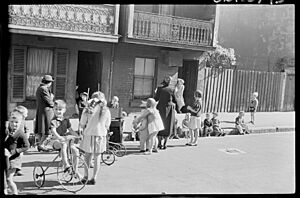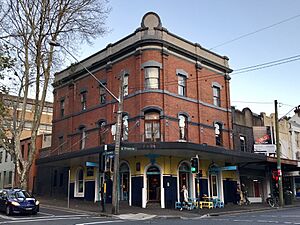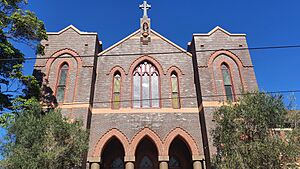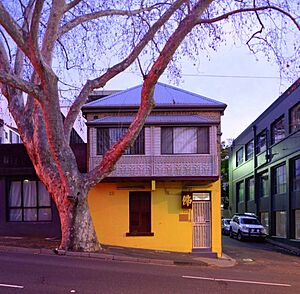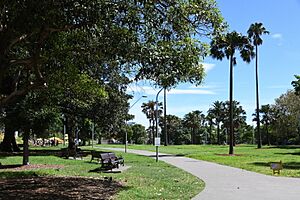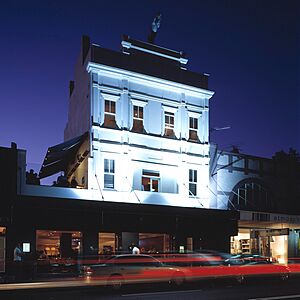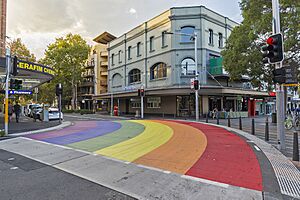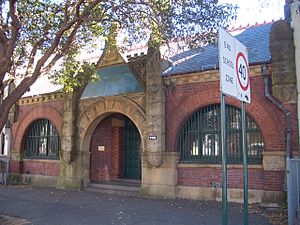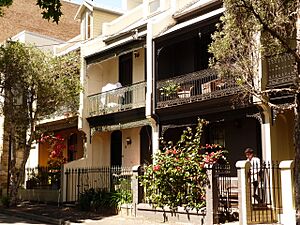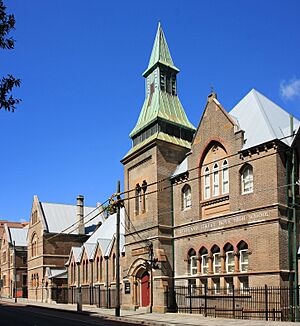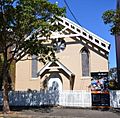Surry Hills facts for kids
Quick facts for kids Surry HillsSydney, New South Wales |
|||||||||||||||
|---|---|---|---|---|---|---|---|---|---|---|---|---|---|---|---|
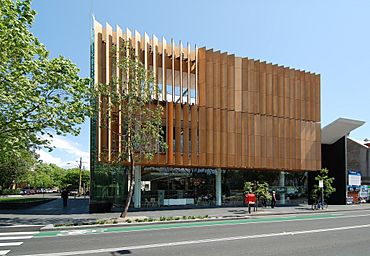
Surry Hills Library and Community Centre
|
|||||||||||||||
| Postcode(s) | 2010 | ||||||||||||||
| Elevation | 51 m (167 ft) | ||||||||||||||
| Area | 1.2 km2 (0.5 sq mi) | ||||||||||||||
| Location | 1 km (1 mi) SE of Sydney central business district | ||||||||||||||
| LGA(s) | City of Sydney | ||||||||||||||
| State electorate(s) |
|
||||||||||||||
| Federal Division(s) | Sydney | ||||||||||||||
|
|||||||||||||||
Surry Hills is a lively suburb located just south-east of the Sydney central business district in New South Wales, Australia. It's known for its mix of homes, shops, and small businesses. People sometimes call it "Surry" for short.
This area is bordered by several streets: Elizabeth Street and Chalmers Street to the west, Cleveland Street to the south, South Dowling Street to the east, and Oxford Street to the north. Crown Street is a busy road filled with many places to eat and hang out.
You'll find Central Station in the north-west part of Surry Hills, which is a major transport hub. Prince Alfred Park is also nearby, offering a great green space. Surry Hills is a multicultural suburb, meaning many different cultures live there. It has a special connection with Sydney's Portuguese community.
Contents
Surry Hills: A Look at Its Past
The first land in Surry Hills was given out in the 1790s. Major Joseph Foveaux received a large piece of land. He named his property Surry Hills Farm, after the Surrey Hills in England. A street, Foveaux Street, is named after him today.
In the early 1800s, much of the area was open land, especially around what is now Prince Alfred Park. A few houses were built in the late 1820s. For a long time, Surry Hills was a mix of homes for wealthy people and houses for working-class families.
In 1820, a cemetery called Devonshire Street Cemetery was created. Many early settlers were buried there. Later, this cemetery was moved to make way for the Central railway station, which opened in 1906.
From the 1850s, many terrace houses and small cottages were built. The area became a working-class suburb, with many Irish immigrants. It was also known for some crime during this time. A famous Sydney figure, Kate Leigh, lived in Surry Hills for over 80 years.
In 1896, one of Australia's first films, Patineur Grotesque, was filmed in Prince Alfred Park.
After World War II, many new families moved to Surry Hills because homes were affordable. However, from the 1980s, the area started to change. Many old houses were fixed up, and new residents moved in, making it a more upscale area. Today, it's a popular place for young professionals and families.
Trams in Surry Hills
Surry Hills used to have a tram system. From 1881, a steam tramway ran down Crown Street. Over the years, the tram lines were extended. The tram line along Crown Street closed in 1957. Today, some bus routes follow the old tram paths.
What Surry Hills is Like Today
Surry Hills has a mix of homes, shops, and light industries. It's still a major hub for fashion businesses, especially on its western side. The area is also home to a large and welcoming LGBTQIA+ community. Sydney's Gay and Lesbian Mardi Gras (Pride Parade) often takes place nearby.
The Surry Hills Markets are held on the first Saturday of every month in Shannon Reserve. The Surry Hills Festival is a big yearly event that brings many people to the area. The Surry Hills Library and Community Centre is also a central spot for locals.
Surry Hills in Books
The famous novel The Harp in the South by Ruth Park is set in Surry Hills. Published in 1948, it tells the story of an Irish-Australian family living in the area when it was a poorer part of the city. A second book, Poor Man's Orange, continued their story.
Getting Around Surry Hills
Central railway station is right on the western edge of Surry Hills. It's the biggest train station in Sydney. Buses also serve the area, making it easy to get around. The Eastern Distributor is a major road on the eastern side.
Main roads include Crown Street, Cleveland Street, Bourke Street, and Foveaux Street. Surry Hills is also close enough to the Sydney CBD that you can easily walk there. There are also many bike paths for cyclists.
A new light rail system, the CBD and South East Light Rail, opened in Surry Hills in 2019 and 2020. This project helped connect the area even better to other parts of Sydney.
Places of Worship
Surry Hills has many different places of worship for various faiths.
- Chinese Presbyterian Church
- Christian Israelite Church
- Dawn of Islam Mosque
- Holy Trinity Greek Orthodox Church
- King Faisal Mosque
- St Peters Catholic Church
- Surry Hills Baptist Church
- Sydney Streetlevel Mission (The Salvation Army)
Famous Landmarks
Surry Hills is home to many interesting landmarks.
- Sydney Police Centre
- Belvoir Street Theatre
- Prince Alfred Park & Swimming Pool
- Tom Mann Theatre
- Harmony Park
- Ward Park
- Rainbow Crossing, Taylor Square
- Surry Hills Library and Community Centre
- The Kirk
Restaurants and Cafes
Surry Hills is famous for its huge number of cafes and restaurants. You can find almost any type of food here! It's one of the best places in Sydney to try different cuisines.
Pubs and Bars
Because of its history, Surry Hills has many pubs. These buildings often have beautiful old designs, from Victorian to Art Deco styles. Many have been updated to include modern restaurants and facilities.
Historic Buildings
Surry Hills has many buildings that are important to its history. Some of these are listed on the New South Wales State Heritage Register, meaning they are protected.
- Durham Hall
- Holy Trinity Greek Orthodox Church, Surry Hills
- Busby's Bore (an old water tunnel)
- Cleveland House, Surry Hills
- Crown Street Public School
- Crown Street Reservoir
- Hopetoun Hotel
Other important historic buildings include:
- Bourke Street Public School
- Children's Court
- Former Police Station
- Society of Friends Meeting House
Homes in Surry Hills
Most homes in Surry Hills are grand Victorian terraced houses. These are long, narrow houses built in a row. There are also some public housing units. Some old buildings, like former hospitals, have been turned into apartments.
Schools in Surry Hills
Surry Hills has several schools, including:
- Bourke Street Public School
- Crown Street Public School
- Sydney Community College
- Australian Institute of Music (Sydney Campus)
Who Lives in Surry Hills?
Surry Hills is a mix of people. Many wealthy newcomers have moved in, but there are also people who have lived there for a very long time.
In 2021, the population of Surry Hills was about 15,828 people. Most homes (68.5%) are flats or apartments. Many people in Surry Hills don't own a car (47.5% of homes). A lot of people walk or use public transport to get to work. Many also work from home.
Historically, after World War II, many immigrants from Europe, especially from Greece, Portugal, and Italy, came to live in Surry Hills. Today, while many people speak English, you can also hear languages like Cantonese, Mandarin, Thai, and Greek spoken at home.
Notable People from Surry Hills
- Jimmy Hannan (1937–2019), a well-known radio and television host.
- Kate Leigh (1881–1964), a famous figure who lived in Surry Hills for many years.
- Jessica Mauboy, (born 1989) a popular singer and actress.
- Ruth Park (1917–2010), an author whose famous book The Harp in the South was set in Surry Hills.
- Kenneth Slessor (1901–1972), a poet who wrote many poems about Surry Hills.
- Brett Whiteley (1939–1992), a famous artist who had a studio in Surry Hills.
Images for kids
See also
 In Spanish: Surry Hills para niños
In Spanish: Surry Hills para niños
 | Georgia Louise Harris Brown |
 | Julian Abele |
 | Norma Merrick Sklarek |
 | William Sidney Pittman |



